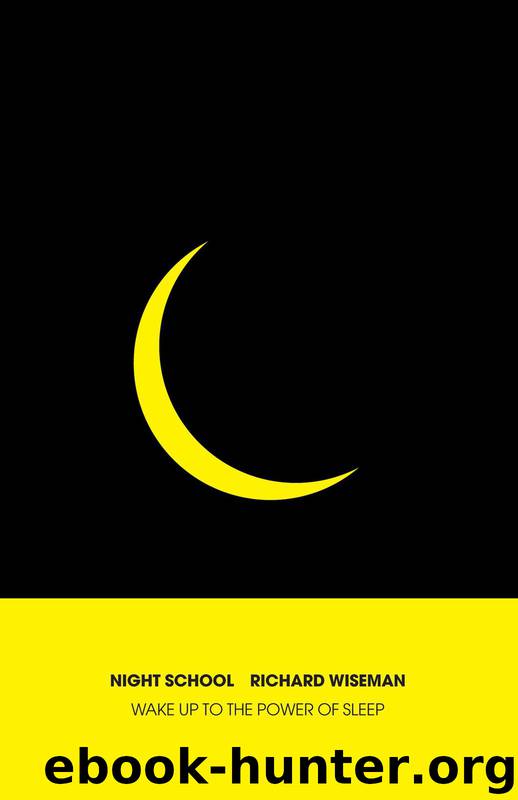Night School: Wake up to the power of sleep by Wiseman Richard

Author:Wiseman, Richard [Wiseman, Richard]
Language: eng
Format: epub
ISBN: 9781447252061
Publisher: Spin Solutions Ltd
Published: 2014-03-08T05:00:00+00:00
The power of napping
Sleep learning does not require a full night of rest. In fact, even the shortest of naps can have a surprisingly big impact. In one Harvard study, for instance, volunteers were asked to try to memorize a list of words. Half of these volunteers were then allowed to take a twenty-minute nap while the others remained awake. When the researchers repeated the tests four hours later they found that the power nap had significantly boosted the volunteers’ memories.24 Exactly the same is true for those trying to learn new physical skills and abilities.25
Other research has shown that even a few minutes spent napping can make all of the difference. In 2008, for instance, German scientists from the University of Dusseldorf asked volunteers to memorize a list of words and then randomly allocated them to one of three groups.26 The first group remained awake, the second slept for about forty minutes, and the third took a quick six-minute nap. When asked to recall the words, the Wide Awake Club did OK, the forty-minute sleepers did better, and those who nodded off for just six minutes came top of the class.
The effect even works on the youngest of minds. In 2013, psychologist Rebecca Spencer from the University of Massachusetts Amherst investigated whether a quick nap boosted the memories of children who were between three and five years old.27 Spencer first asked the children to play a memory game in which they had to try to remember the location of various pictures in a grid. The children were then either encouraged to nap for just over an hour or remain wide awake for the same amount of time. Finally, the children’s memory for the location of the pictures was tested the following day. The results provided more evidence for the power of napping, showing that the short nap boosted the children’s memories by a remarkable 10 per cent.
Developing a super-powered memory is not the only psychological benefit to be gained through napping. Research by NASA revealed that pilots who take a twenty-five-minute nap in the cockpit – hopefully with a co-pilot taking over the controls – are subsequently 35 per cent more alert, and twice as focused, than their non-napping colleagues.28 And, in 2009, sleep researcher Kimberly Cote from Brock University in Canada reviewed the vast amount of psychological work into napping, and concluded that even the shortest of snoozes causes significant improvements in people’s mood, reaction time, and alertness.29
Psychologists are not the only ones to have become interested in the power of a catnap. Harvard University medical researcher Dimitrios Trichopoulos recently published the results of a six-year study into health and napping.30 Trichopoulos and his team studied the lives of more than 20,000 adults aged between twenty and eighty. All of the participants were asked about their dietary habits, levels of physical exercise, and the extent to which they napped. Even after taking age and level of physical activity into account, those who took a thirty-minute siesta at least three times a week had a 37 per cent lower risk of heart-related death.
Download
This site does not store any files on its server. We only index and link to content provided by other sites. Please contact the content providers to delete copyright contents if any and email us, we'll remove relevant links or contents immediately.
The Art of Thinking Clearly by Rolf Dobelli(10465)
Mindhunter: Inside the FBI's Elite Serial Crime Unit by John E. Douglas & Mark Olshaker(9328)
Change Your Questions, Change Your Life by Marilee Adams(7767)
Nudge - Improving Decisions about Health, Wealth, and Happiness by Thaler Sunstein(7696)
Mastermind: How to Think Like Sherlock Holmes by Maria Konnikova(7328)
The Power of Now: A Guide to Spiritual Enlightenment by Eckhart Tolle(5763)
Men In Love by Nancy Friday(5236)
Altered Sensations by David Pantalony(5095)
Factfulness: Ten Reasons We're Wrong About the World – and Why Things Are Better Than You Think by Hans Rosling(4737)
The Confidence Code by Katty Kay(4252)
Thinking in Bets by Annie Duke(4219)
Man and His Symbols by Carl Gustav Jung(4131)
The Worm at the Core by Sheldon Solomon(3486)
Why Buddhism is True by Robert Wright(3448)
Liar's Poker by Michael Lewis(3445)
Three Women by Lisa Taddeo(3428)
The Inner Life of Animals by Peter Wohlleben(3313)
Descartes' Error by Antonio Damasio(3273)
How Music Works by David Byrne(3262)
